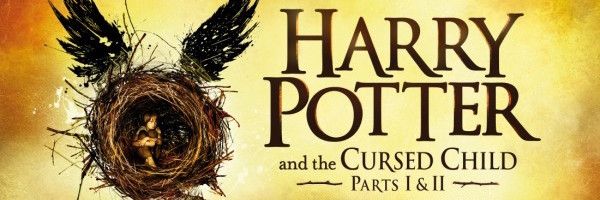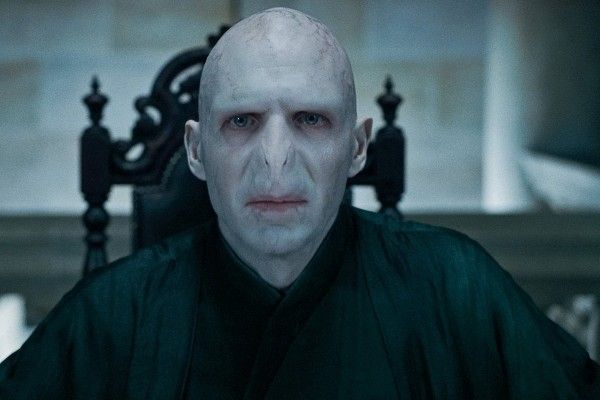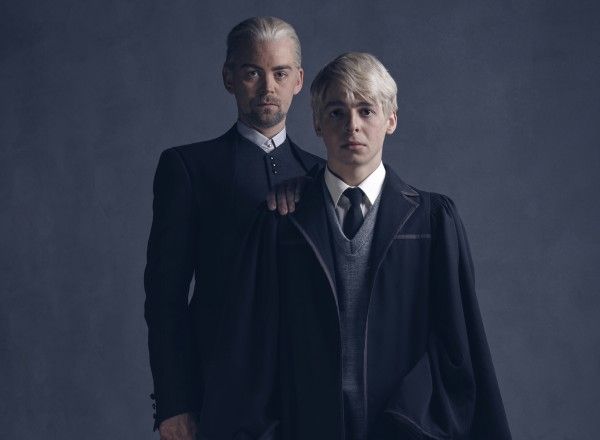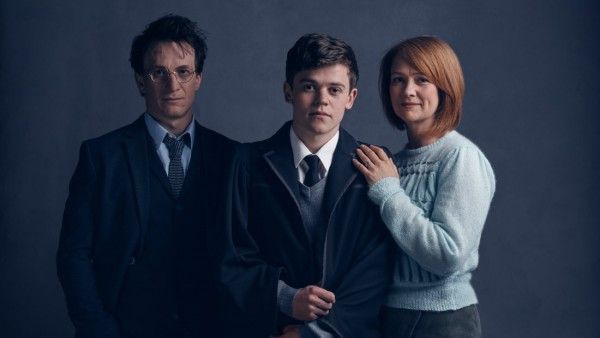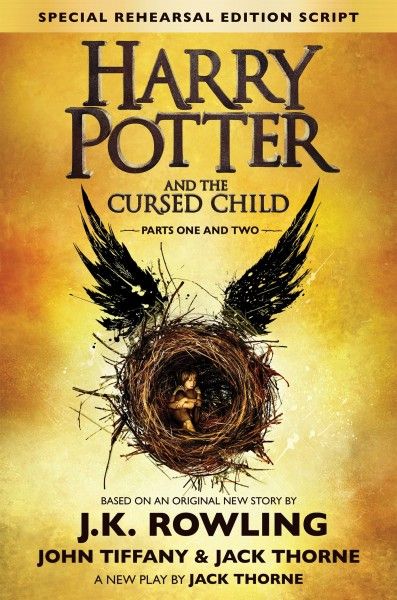As someone who was lucky enough to have seen Harry Potter and the Cursed Child on the West End stage, you might think the question, “Who is the Cursed Child?” would be an easy one for me to answer. You would be wrong. Like so much of the Harry Potter fictional universe — J.K. Rowling (and brilliant The Cursed Child writer Jack Thorne) are much too masterful for that.
The Cursed Child is thematically rich in so many ways, a treatise in the baggage we carry with us all (both through the wall at Platform 9 ¾ and, more importantly, emotionally). It asks questions like: “How is our identity shaped by our parents?”, “Do we ever really grow up?”, and “What effect does our past — and the people we love who are no longer with us — have on the person we are in this moment?”
Coming out of The Cursed Child, I wasn’t sure if I could tell you the identity of the eponymous cursed child, but that wasn’t a dissatisfying revelation in any way. We are all of us cursed children, in some ways. Cursed with the burden of the knowledge that we won’t live forever, and that the people we love won’t live forever, and that — even in a world rife with magic — this is one truth no spell (resurrection stones, aside) can change. Let’s take a look at all of the cursed children in the latest Harry Potter installment...
Harry Potter
I was not expecting for The Cursed Child to get so very retrospectively dark about Harry’s troubled past, but did it ever — and it was one of the best parts of the all-around brilliant play. In the present-day storyline, Harry’s behavior — and most particularly his parenting decisions regarding Albus — were not always the wisest. However, the brief, atmospheric, heartbreaking flashbacks to major moments from his childhood put them in perspective and made Parent Harry deeply sympathetic, even in the most face-palmy of moments.
In these flashbacks, we see Harry stuck living (unloved) in a cupboard, visiting his mother and father’s grave, and Hagrid finally coming to tell him about his magic on his eleventh birthday. We get to see a loving Lily Potter as she takes her baby son for a walk through Godric’s Hollow. The dramatic irony is tragically strong with this one.
Later, in one of the most emotional moments of the five-hour, two-part play, we witness a conversation between Harry and Dumbledore’s portrait in which Harry is finally given the chance to express his anger at Dumbledore for leaving him to be raised by the Dursley’s, manipulating into being The Chosen One, and for ultimately leaving him behind in death to face it all on his own. The conversation is one seven books in the making, one that Harry and Dumbledore were only partially able to have when they met in purgatorial King’s Cross while Harry was between life and death at the end of The Deathly Hallows.
Harry’s arc in The Cursed Child is his struggle to get past his abusive childhood and the PTSD he still suffers as a result of the terrible events that helped to define his adolescence. Sure, he has made some progress in the 19 years since he graduated from Hogwarts, but another potential rise of Voldemort and, perhaps more importantly, the struggle of being a good parent to Albus, make him face his cursed past more than ever before.
Delphi Diggory
In Harry Potter and the Half-Blood Prince, Bellatrix Lestrange tells her sister, Narcissa Malfoy: “If I had sons, I would be glad to give them up to the service of the Dark Lord!” Yeah, Bellatrix was kind of a dick. And, yes, J.K. Rowling is so, so good at foreshadowing (if this was, in fact, foreshadowing and not just a lucky throwaway line). In The Cursed Child, we learn that Lord Voldemort and Bellatrix Lestrange had a baby together, a girl who would grow up parent-less and neglected to become the woman we first meet as Delphi Diggory in the play. Delphi is obsessed with knowing her father, so much so that she manipulates Albus and Scorpius into traveling into the past in an effort to meet dear old dad. (No, she doesn’t tell them this is her goal. Yes, they are pretty gullible.) Delphi’s curse is not that she was born to the worst parents in the world, but that she never had a chance to even be loved by them — if they would have even been capable of such love. Instead, she is raised by Rowle family and didn’t seem to have a particularly happy childhood (a la Harry Potter). The climax to the play is heartbreaking because it is clear that, even though Delphi has done terrible things, she has done it all because she just wants to meet her father. In one of the more startling, yet affecting moments in the scene, Harry yells at Delphi: “You are an orphan. Nothing can ever change that.” This is a curse they must both bear.
Scorpius Malfoy
One of the chief delights of The Cursed Child experience is Scorpius Malfoy, the son of Draco Malfoy and Astoria Greengrass. Scorpius is nothing like you might imagine a Malfoy offspring to be. He is terribly polite, incurably nerdy, and — more than anything — wants to have at least one true friend. He finds this friend in Albus Potter and it makes you wonder if this is the alternative path Harry and Draco’s own relationship could have taken if things had gone differently in Ollivander’s wand shop or on the steps of Hogwarts in their first year. Albus saves Scorpius from this fate. They meet on the Hogwarts Express and become the best of friends, bonding over the fact that they both have legacies they don’t care to be measured against. While Albus is constantly being measured against his father, The Boy Who Lived, and found wanting, Scorpius is plagued by rumors that his true father is not Draco, but rather Lord Voldemort himself. In this way, Scorpius is cursed in some sense of the word, but his true “curse” comes in the loss of his mother, who dies within the first 15 minutes of the play (off-stage, as part of a montage of Albus and Scorpius’ first two years at Hogwarts). In one of the most affecting scenes of the play, Scorpius calls Albus out for being so self-involved in his own pain that he cannot even see Scorpius’... When Albus and Scorpius create an alternate timeline with a stolen Time Turner, all Albus can think about is how he still can’t get along with his dad. Scorpius, meanwhile, is quietly devastated that his mother is dead in this timeline, too. It is a sadness he must live with on top of having his own struggles connecting with his father and being separated from his best (and only) friend on top of that. I don’t think Scorpius is a main candidate for The Cursed Child, if we are forced to pick just one, but his cursed-ness is present, nonetheless. Inevitably, however, it is what he has and receives from both his father and his best friend that keeps him from being truly cursed.
Albus Potter
At one point in The Cursed Child, Draco Malfoy extolls a major theme of the play in dialogue form, saying: “People say being a parent is the hardest job. They’re wrong. Growing up is. They forget.” If any one character encapsulates this theme more than any other, it is Albus Potter because, in so many ways, he is the least cursed of this bunch. In fact, he has had a relatively blessed childhood. Sure, he has trouble communicating with his dad, but he is safe and he is loved and he has never truly had to deal with loss. In many ways, Albus acts as a counter to all of those characters who have been truly cursed by loss. This means he has the potential to come off as kind of an entitled brat, complaining about his terrible lot in life. But The Cursed Child, like the other Harry Potter installments, has an enormous amount of empathy for all of its characters. In one memorable scene, Harry asks Portrait Dumbledore: “I never asked you how you felt about my naming [Albus] after you.” Dumbledore tells him: “Candidly, Harry, it’s an awful lot of pressure.” Futhermore, the fact that Albus has such a hard time in this play tells you everything you need to know about Rowling, Thorne, and director John Tiffany’s feelings on the struggles of growing up. You don’t have to be dealt a particularly tough hand for adolescents — and life, in general — to be hard. This is the universality of the Harry Potter universe. At another point, Draco confesses to Harry that he was always envious of his friendships with Ron and Hermione. They had one another. Draco, on the other hand, was unbearably lonely. Ginny, who had what was perhaps the best family in the entire Potter-verse, confesses that she felt the same way. If growing up is difficult, then there are so many ways to be cursed in that necessary struggle. Even when you have a loving family.
So Who Is the Cursed Child?
Ultimately, I don’t think The Cursed Child wants us to come away with a clear answer for this one — or, rather, perhaps it wants us all to have a different one for ourselves. The Cursed Child has so many entry points for audience members. Perhaps you relate best to the parent struggling to connect with their child? Or the child mourning the loss of a parent they never knew? Or the teen trying to understand their place in the world? If forced to chose, my Cursed Child would be Harry Potter himself, though I would entertain an argument for Delphi. If Harry is the Cursed Child, then this play is a hopeful narrative that all that can be overcome in the presence of love — even when so much pain, loss, and abuse has been suffered. If Harry is the Cursed Child, then even Delphi has hope.

